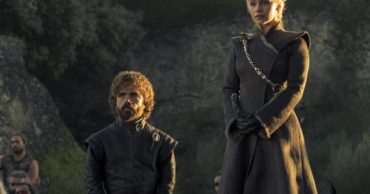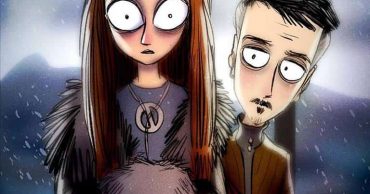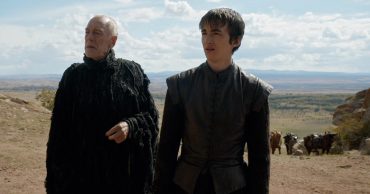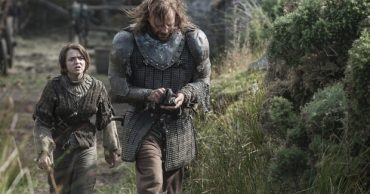
As winter begins in Westeros and the Night King heads south, the lion, the dragon, and the wolf stand head and shoulders above the world south of The Wall, a converging of destinies that comes to life in Game of Thrones‘ most epic, momentous episode in history, tracing the paths of its destined rules as they descend upon their thrones. The King in the North rises as the King of the Andals jumps out a window, while two Queens set themselves on a collision course with each other: there aren’t enough superlatives to speak to the scope and reach of “The Winds of Winter”, a finale that almost swallows itself whole with massive moments, huge reveals, and a devastating array of iconic, world-changing images.
It all begins, of course, with Cersei exacting the revenge Olenna accidentally prophesied back in “The Broken Man”; the seemingly audacious claim to exert her power on all her enemies comes true with one massive explosion, taking down the High Septon, Margaery, and everything they brought to the world of Westeros. Undoubtedly a huge moment for Game of Thrones in repositioning King’s Landing before the big, final stories, but it ends Margaery’s story on a wildly disappointing note, yet another dreamer for the throne who gets left in Cersei’s bloody, fiery wake. Her allegiance to the High Septon turns out to be nothing but a short distraction, the slowly dying flame Lancel tries so hard to blow out representing her character more than the explosion that followed it.
In the end, Margaery’s ability to position herself with men in power turned out to be her downfall; as Cersei blasts DMX’s “We Don’t Give A F*ck” out the windows of King’s Landing, Margaery’s ultimate influence on the “great game” turns out to be as incidental and meaningless as Stannis or even Robb Stark. Her character, one of the show’s early shifts towards portraying females as something more than boobs with heads above them, ends up dying an insignificent death, a byproduct of both Cersei’s fierce anger and Game of Thrones‘ general need to begin wrapping up smaller stories, a season-long trend that comes to a head in loud, satisfying fashion in the final two hours of season six. As disappointing as Margaery’s death is, seeing Cersei sit down on the Iron Throne is a chilling image to leave King’s Landing with, a true sign that the end game of Game of Thrones is beginning, and the time for adults to sit at the table and play.
Across the sea, Dany gets an equally rushed, yet satisfying story when Tyrion pledges his loyalty to Dany (and as a by product, turns against his sister back home) and advises she send away Daario, whose presence was good for some mid-series skin candy, and not much else. Adios, Daario, have fun ruling Meereen! The bigger parts of Dany’s story are, oddly enough, the stories that revolve around her: one of the big reveals of “The Winds of Winter” is the alliance formed between Dany (on behalf of Varys), Ellaria Sand, and Olenna Tyrell, the latter pair acting out of desperation to find a home now that everyone else in the world has either murdered their family, or hate them for their trangressions against the crown.
Like the two Kingslayers who sit at Riverrun in this episode, Olenna and Ellaria at the same table puts a nice thematic touch on this story: Olenna and Ellaria have both shown willingness to kill leaders in their quest for power, which helps give a bit of voice to the many unexplained threads that bring these players to the same table in Dorne. “The Winds of Winter” is about as graceful with plot advancement as Samwell Tarly with a sword: there are wholesale chunks of story missing from this alliance, and yet, it’s still exciting as hell to see it all come together. “The Winds of Winter” makes tunneling its many narratives together an absolute priority, and it provides such visceral thrills and exciting moments, even if it disappoints in how it abandons the carefully-laid path laid out by seasons before it: it’s taken a long time to get here, and it certainly feels like neither “The Winds of Winter” and “The Battle of the Bastards” has the patience to appreciate that, a necessary evil that always undercuts just a little bit of the satisfaction out of the big, iconic scenes of the episode.
There’s no more perfect example of this dichotomy than Bran’s visit into the Tower of Joy: here is one of the most important moments of the series, revealing Jon Snow’s parental lineage, a secret theorized by fans for years. And yet, it’s barely two minutes we spend in that room, laying out the necessary details and getting the f*ck out of Dodge because there’s so much other stuff going on. We don’t even get the context of where Bran is at the moment: Benjen’s like “we’re close to the wall, I’m out”, we’re in the dream, and then we’re back in Winterfell. The sense of whiplash in this episode is strong, and it steals away from some of the show’s biggest moments, even as it delivers on visual and emotional scale in ways the series has never approached.
Arya’s story is another victim of this trend: as entertaining as it is to see her finally start crossing names off her list, there are lot of unanswered questions as to what’s happened to the little Stark girl. I mean, she chops up an entire family and feeds them to Walder, then slits his throat and smiles as he bleeds out slowly: she’s become absorbed by the violence of Westeros, the deaths of her family and friends transforming her into a type of monster we haven’t seen much in Westeros. Forget the logical questions (where she’d get the faces she’s using? How is she traveling? Where’s Needle? Did Hot Pie help her cook??!!!), Arya’s sudden appearance and change in demeanor is as stark (sorry) a shift in character as anyone we’ve seen in the series (save for her own sister, who reflects on her own change in one of the show’s few rewarding, brief reflective moments). However, now we know why Game of Thrones hasn’t given us Lady Stoneheart: Arya’s already filling the role nicely, ready to slit throats across Westeros until there isn’t a single enemy left.
As epic and exciting as it is choppy and superifical, “The Winds of Winter” represents a number of big changes to Game of Thrones, both on-screen and off. With women taking power across Westeros (even Lady Mormont puts every single Lord of the North in their respective places, with the mic drop moment of 2016), the War of Westeros has completely changed tambor, while the other, greater war, simmers somewhere close to the Wall. For all intents and purposes, “The Winds of Winter” feels like the beginning of the end for Game of Thrones, and with it, a number of dynamic and fundamental shifts in the show’s storytelling. Gone are the nuanced relationships between smaller characters, gone are the days when stories would wander between locations, touching on the themes of history, memory, and legacy: as the episode so astutely points out, “the past is gone for good”, and with it goes the old storytelling ways of Game of Thrones.
This is by design, of course, but it also changes the experience of the show: what was once a show full of rich characters engaging in complex individual stories have been thrown into a singular pot as all points converge unto a mere few. Characters and stories are mashed together without much explanation (again, the Dorne alliance happens real fast), entire plots and houses are excised in swift fashion, and the show’s entire examination of religion is blown up in one massive, expensive-looking moment. The “Big” moments are all that Game of Thrones has left as it, so the impetus is on “The Winds of Winter”, and the rumored 13 episodes left to wrap up all these stories (where the hell is Jorah! Or Brienne! Or Nymeria!!!), to deliver on these moments in powerful ways.
Does it? There’s no denying how satisfying and exciting some of these images and turns of stories are (I shrieked loudly when Tommen jumped out the window, and when Margaery shared a knowing, defeated look with the High Septon), but there’s hardly time for any of these moments, be they tragic or momentous, to resonate through the world of Westeros. For half the episode, it’s hard to pay attention to what’s happening, because everything appears to be going on under the pretense that nobody knows King’s Landing is burning, the Sept of Baelor suddenly a pile of ashes hundreds of people (and the King) are buried with. “The Winds of Winter” has so much to accomplish, it lands with less weight than the death of Ned Stark’s back in season one, a moment that arguably has less momentum and consequence. It speaks to the personal understanding of characters Game of Thrones loses a bit in its bigger moments: and as its scope shifts from large to gigantic, all while narrowing its field of players and stories, that fundamental change in how Game of Thrones tells stories is going to change how these final seasons (if the rumors are to be believed) look, feel, and play out.
Then again, this is what we’ve been waiting for, isn’t it? At some point, even Game of Thrones becomes too big and ambitious for even HBO’s pockets, so some serious streamlining and condensation is to be expected. Thankfully, when “The Winds of Winter” wants to deliver a big moment, be it Cersei’s big moment, Tommen’s death, the declaration for the King of the North, or the reveal that Jon Snow is actually Jon Starkgaryen (maybe he should just hyphenate?), it f*cking delivers, finishing off a fantastic season of Game of Thrones: The Next Generation, ending a resurgent sixth season by burning the entire damn thing down, putting all of its big pieces in place for the devastating final run. It’s probably going to be awhile before we see Game of Thrones again, but boy is it going to be a fun ride when it returns.
Other thoughts/observations:
- Melisandre is now a free agent, an under-the-radar development that could have some fun ramifications next season. Or, like Margaery’s story, it just might not.
- To which, RIP Tommen and Margaery. True love it was not.
- The real question in King’s Landing is whether Jaime thinks Cersei has gone too far. Is he happy to see their shared prophecy come true? Or is he miserable that he couldn’t stop King’s Landing from burning after all? If there’s one disappointing development in season six, it’s how adrift Jaime’s character has become.
- Tyrion, Hand of the Queen. Look at me now, Dad!
- Samwell is one happy Westeros nerd.
- Boy, Littlefinger is not happy. Sparrow vs. Sansa is going to be a fun one.
- About time Pycelle got offed… just sad that hooker will never get paid.
- “It felt good.” Cersei, in her most FTW moment ever.
- I don’t know if it was intentional, but Littlefinger’s dye job was glaringly obvious.
- “This is actually happening.” Tyrion, summing up everyone’s thoughts during the episode.
- So… what about Euron? He’s about the only power player we don’t see in “The Winds of Winter”, and is surely up to some shenanigans.
- The score in this episode was absolutely flawless.
- And that’s a wrap on the most exciting Game of Thrones season we’ve had in years. Thanks to everyone who stopped by this season – see you in 2017? 2018?
 Follow Us
Follow Us






Visitor Rating: 5 Stars
Visitor Rating: 4 Stars
Visitor Rating: 5 Stars